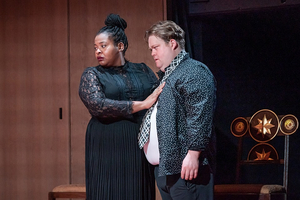Interview: Danny Kirrane Talks VASSA at Almeida Theatre

Following his acclaimed performance in The Hunt this summer, Danny Kirrane has returned to the Almeida Theatre for Mike Bartlett's adaptation of Maxim Gorky's Vassa, directed by Tinuke Craig. He spoke to BroadwayWorld about the play, his role, and the company's rehearsal process.
How would you describe Vassa in a nutshell?
Vassa is a Russian revolutionary play by Maxim Gorky, and it's about a family where the patriarch is dying. The matriarch, Vassa, is trying to hold onto the family business, while the grown-up children want to get their inheritance so they can move away. It's basically about how money corrupts family.
Which of the play's themes or ideas resonated most strongly with you?
I latched onto the idea that all the characters are really unhappy, because they're living in this prison of a house they want to leave. A lot of good drama comes from situations where people want to - or have to - leave or stay in a particular place. And in this play, they all feel crammed. It all felt to me a bit like One Flew Over the Cuckoo's Nest, because we have these madcap characters being dialled up. I once saw the play described as 'Chekhov on acid'. It has this zingy-zangy energy underneath it that distinguishes it from a lot of the plays written at the time.
What's in it for today's audience? Why this play now?
We still live in a massive capitalist structure, though family is, for the most part, a socialist entity, because we tend to look after each other. And it does something to a family when you know that power will change hands; this will always be something universal. Like going back home for Christmas - when you're all stuck in the house and you've all got to get on and be polite. The play is funny, dark, and entertaining. And different from anything else on at the moment.
Tell us about the rehearsal period. How did the company deal with Samantha Bond's injury-related withdrawal?
Obviously we were all devastated when Sam left, and we didn't have much time. And sometimes when that happens, it brings the company together more. So I feel that we are closer now than we would have been if that hadn't happened, because we all had to work very quickly. It allowed us to rethink what we had come up with previously. It was actually quite a positive thing, really. We got to look at the play with fresh eyes.
What about your character, Semyon, excites you the most? How have you dealt with his humour?
What I tried to do with him is work out loud what makes him tick. What does he think about himself, especially in a house like this, where he feels trapped? What does he think other people think about him? He's a bit of a sad clown. I don't think you see that all the time, but there are times when he opens up slightly, and you see that he's like a little boy underneath it all. The humour comes from the fact that he's a bit of a lost boy.
The key to him is that he has hopes and dreams. All his interjections about the jewellery shop are like a comfort blanket to him, rather than him trying to be funny. He's reassuring himself that he'll get out of this hell. There's truth behind his madness, and I'm trying to play that truth.
How did you prepare for the role? How much research about the historical context was involved?
We looked at Russian history in the early 20th century, and we looked at Gorky. But we ultimately placed the play in a timeless setting, which, in general, can be difficult for audiences sometimes. But it helped us step away from making it too 'now' or 1909. For me, it's all about the characters. I think a really good play is as much about the characters as about the story. Characters are always timeless, because humans don't change that much.
Have you gone back to the source text or the literal translation in your preparation?
We did lots of that in the rehearsal room; we read other versions as well. Especially there was an 80s radio play that we used quite a bit early on. But obviously Mike Bartlett's version is great; it modernises the play without taking away its heart.
Do you have a favourite moment in the play?
Natalya's got a great speech near the end where she gets angry at Vassa and finally loses her rag. I always love that bit and being onstage at that point, because you can see the effect of the scene on the audience. I also really like the stuff Semyon says about the jewellery shop and his future, because it's about his hopes and dreams, and we all have those. It's universal. I like the fact that he really believes he has a shot. In his head, that's all he wants. He's quite simple in that moment - and quite pure.
Vassa at the Almeida Theatre until 23 November
Photo credit: Marc Brenner
Comments
Videos

